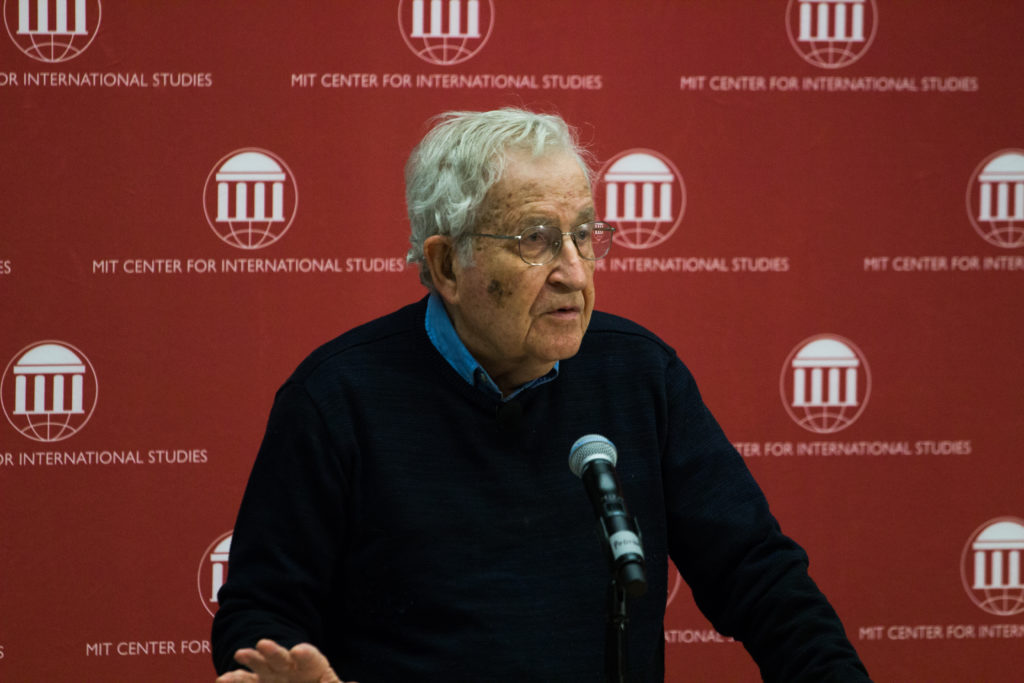By Maggie Dolan, news staff
Nov. 8, 2016, marked two key events in international climate policy. The 22nd United Nations Climate Change Conference began in Morocco to discuss worldwide climate change response, and the United States elected Donald J. Trump as its 45th president. Noam Chomsky, political activist, linguist, writer and Massachusetts Institute of Technology (MIT) professor emeritus, described a third planet-altering event that occurred on Nov. 8: The world remained silent.
“The leader of the free world is leading the world to disaster. The world is looking to China to save it, and what’s the reaction?” he said. “Silence. Not a word about it.”
Chomsky gave a presentation entitled “Racing to the Precipice: Global Climate, Political Climate,” at MIT on Thursday as part of a Starr Forum speaker series. During his talk, he compared recent scientific studies and articles, world action and United States counter action regarding climate change policy. He concluded that the United States is becoming increasingly responsible for the world’s environmental ruin.
“The world outside the United States is taking steps toward facing the existential challenge of survival,” Chomsky said. “And meanwhile, the United States, virtually alone, is racing toward destruction with enthusiasm and dedication.”
He cited Ernst Mayr, a biologist who claimed that less intelligent forms of life have statistically better chances of surviving, based on Earth’s historical data. Chomsky left the audience with a question Mayr first presented; As humans developed more climate-endangering technologies and nuclear capabilities: Is it better to be stupid than smart?
“The average lifespan of a species is about 100,000 years,” he said. “We’ve doubled it. We’re at about 200,000, so we’re a little beyond the expected extinction point.”
To investigate his question, Chomsky cited the National Snow and Ice Data Center, The Washington Post and Bloomberg Businessweek, listing climate change and oil industry data published in the past few months.
The Starr Forum series, hosted by MIT’s Center for International Studies (CIS) and sponsored by the Starr Foundation in New York, is free and open to the public. The panels are held to discuss international relations issues. Previous forum topic from this year’s series included “Security, Privacy & the Internet,” “The Fight Over Foreigners: Visas & Immigration in the Trump Era” and “The Struggle Against Terrorism: Lessons Learned & Next Steps.”
Michelle Nhuch, director of public programs for the CIS, said in an e-mail to The News that the programs aim to attract a wide demographic by advertising broadly, opening them to the public and posting videos of the talks online.
“The Center’s Starr Forum series hopes to spawn constructive dialogue at MIT and beyond on pressing global issues,” Nhuch said. “We hope to inform the conversation by bringing to campus leading academics, policymakers and journalists.”
She said that global situations can be overwhelming for people to think about in their busy lives, but that Chomsky presented simple opportunities for the public to make a difference.
“Noam offered that we can each make a difference ranging from lifestyle choices to impacting the political system,” she said. “For example, if a bill can be passed in San Diego to reduce greenhouse gases, then it can do so elsewhere.”
Chomsky said industry has enough control over government priorities that even Republicans who do believe the planet is warming can do little about it. But some states, Massachusetts included, have taken steps toward passing legislation that will reduce the use of greenhouse gases.
“Several Massachusetts Democrats have filed a bill which requires that the state use 100 percent renewable energy by 2025 and mandates elimination of all fossil fuels in the state by 2050,” he said.
He said people can individually enact small changes, from switching to LED lightbulbs to e-mailing local politicians in support of renewable energy measures.
“All of this takes us back to Ernst Mayr’s question, ‘Is it better to be smart than stupid?’” Chomsky said. “It’s a question for you to ponder, and like it or not, for you to answer without too much of a delay.”









